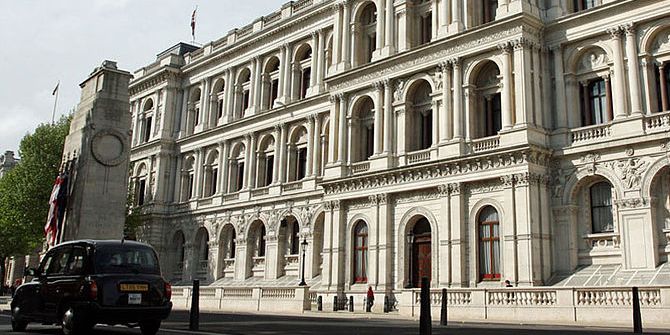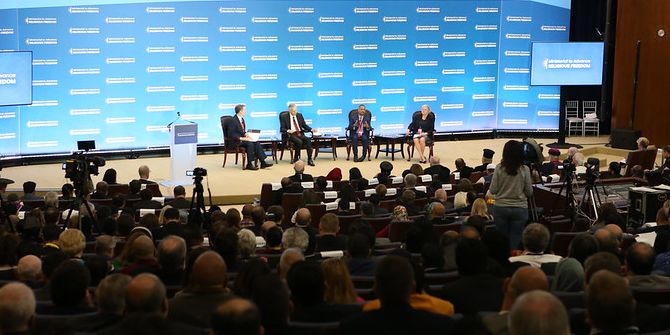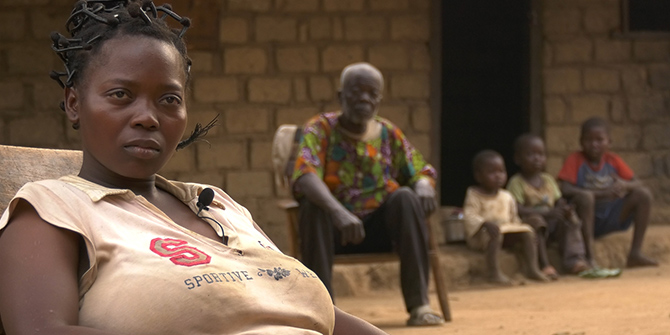The recommendations made in the Bishop of Truro’s recent review of the FCO’s support for persecuted Christians were accepted in full by the then Foreign Secretary Jeremy Hunt. But with a new government in place and Brexit continuing to dominate Westminster, what can the UK realistically do to further religious freedom? Matthew D. Rees has three suggestions.

The persecution of Christians and the international right to freedom of religion or belief has never been a hot subject. A Foreign Secretary and a bishop speaking up about it wasn’t likely to change that.
But the Bishop of Truro’s review into the Foreign & Commonwealth Office’s (FCO) support for persecuted Christians around the world, commissioned in December 2018 by the then Foreign Secretary Jeremy Hunt, has drawn attention to the fact that in the twenty-first century Christians make up some of the most vulnerable communities across the globe.
In his introduction to the report the Bishop of Truro states: ‘It seems to me that we currently face two existential threats to human flourishing and harmonious communities: climate change and the systematic denial of FoRB. We are beginning to pay proper attention to the former. It is high time we paid proper attention to the latter. This Report both outlines the seriousness of the challenge and also suggests how the FCO might better address it.’
While I don’t want to initiate a debate around whether violations of freedom of religion or belief pose the same epistemic threat as that of climate change, this statement does provide context to the threat that comes with violations of freedom of religion or belief. That is, they are large scale, deeply embedded and bring with them a sense that we may be losing control.
In many ways, this is the most prominent example of a state catching up with what many have been trying to draw the world’s attention to for a number of years. Indeed, Open Doors has been trailing the steep escalation of Christian persecution year-on-year through its annual World Watch List which outlines the 50 most dangerous countries in the world to live as a Christian. The 2018 World Watch List data presented the shocking figure of 215 million Christians experiencing a very high or extreme level of persecution – this number rose to 245 million in the 2019 list.
But this still leaves us with the question of what should be done.
The Bishop of Truro’s review has 22 recommendations, and while these were accepted in full by Jeremy Hunt at the time, he’s no longer the Foreign Secretary. With Boris Johnson as Prime Minister and Dominic Raab as Foreign Secretary not only is there a new team in place but there’s a new agenda and a new programme for government.
Boris Johnson may have tweeted his support for the international right to freedom of religion or belief on 8 July when the Bishop of Truro presented his recommendations to the then Foreign Secretary but that already feels like an age ago.
What is obvious from the speech Boris Johnson gave on becoming Prime Minister on 23 July is that Brexit and a domestic agenda will dominate his premiership. While there was a lot in his speech, there wasn’t much foreign policy. Indeed, the only substantial foreign policy reference came with his statement that he would seek to promote the right of every girl around the world to 12 years of quality education. And even this was spoken of in relation to British values.
So where does this leave the international right to freedom of religion or belief?
In an age where Brexit is King we have to be strategic. This is why Open Doors has called on the new government to take three actions – three things which can be implemented quickly and which will make a tangible difference on the ground.
Firstly, the FCO should pursue progress by selecting a small number of priority countries where it can make a real difference. For instance, in the case of persecuted Christians, Nigeria is a key country where the FCO should focus.
Of the countries in the top 15 of Open Doors’ World Watch List, Nigeria is a country with egregious levels of violence against Christians; Open Doors reported that over 3,000 Christians were killed on the basis of their faith in the country in 2018 alone. However, it is also a country which has a good and constructive relationship with the UK and hence there is opportunity for engagement.
If the FCO was to work with the government and civil service of Nigeria to prioritise engagement on FoRB in this way, investing the necessary levels of resources, a real difference could be made. If this strategy simply highlights misdemeanours it will not work, but if it offers constructive support it could lead to fruitful change over time.
Secondly, the role of Prime Minister’s Special Envoy on freedom of religion or belief should be expanded. Having an individual looking at this issue as a priority across government has been extremely beneficial to the mainstreaming of freedom of religion or belief. However, there is also space for the role to evolve.
With greater capacity the envoy’s office could work further with civil society organisations and key NGOs to ensure the government has the most up-to date information on the persecution of religious minorities. Furthermore, if the UK does leave the European Union, the individual in this role should be at the table when future trade deals are negotiated with countries with egregious human rights records such as Turkey, Kazakhstan and Pakistan.
This kind of negotiating seems to have worked before; there is evidence that the Special Rapporteur for freedom of religion or belief for the European Union used the bloc’s trade deal with Pakistan as a carrot for the release from prison of a Pakistani Christian woman, Asia Bibi, who was on death row on blasphemy charges. While we can’t prove the link between the two, there is at least precedent here for a similar approach being replicated in the UK post-Brexit.
Finally, it’s also key that local faith actors are recognised and utilised in development programmes. In many contexts in sub-Saharan Africa and the Middle East, local faith actors take a ‘whole person approach’ and provide spiritual care as well as social and financial resources to a community. They are best placed to be involved in providing trauma care to those who have been targeted on the basis of their faith.
It’s down to us therefore to insist that this issue remains on the new government’s agenda – and using these recommendations as a starting point could keep this issue at the centre of political debate. We simply can’t let this become the end of the conversation. In fact, we must demand that it is just the beginning.
Note: This article is part of our ‘Real-World Approaches: Freedom of Religion or Belief‘ series
Note: This piece gives the views of the author, and not the position of the LSE Religion and Global Society blog, nor of the London School of Economics.





